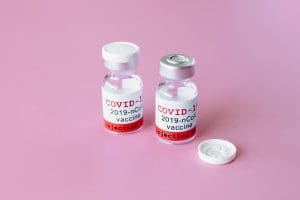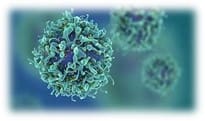
To understand how patients with follicular lymphoma (FL) respond to the COVID-19 vaccine and determine whether the response is altered by the timing of the vaccination (administered before, during, or after treatment), the treatment received, or the stage of the patient’s lymphoma.
The NHS will offer patients with FL COVID-19 vaccination through their vaccination programme. People with FL will need to decide whether to take up the offer. Uptake rates of vaccination by patients with blood cancer have reduced over time. Studies have reported that the vaccination is less effective in cancer patients, particularly those with blood cancer. The following summary information gained from the research may help a person with FL make an informed choice about vaccination.
When a person is given a vaccine, their immune system responds by activating two key types of cells: B cells and T cells. B cells produce antibodies; some become memory B cells, which remain in the body and can produce antibodies if the person is exposed to the virus again. T cells include Helper T cells, which assist in activating B cells and other immune cells; cytotoxic T cells, which directly attack and destroy infected cells; and memory T cells with a similar role to the memory B cells.
B and T cells together ensure a robust and agile immune response, offering immediate and long-lasting protection.
The researchers examined how COVID-19 vaccines worked in 58 patients with FL participating in a national clinical trial called the PETReA study. All patients were receiving treatment for FL for the first time. Treatments included rituximab (which reduces B cells), bendamustine (which reduces CD4+ T cells, a Helper T cell), and chemotherapy. Patients received COVID-19 vaccines at different times: before, during, or after cancer treatment. Blood samples were taken for analysis after the first and second vaccinations. The vaccines used were either Pfizer or AstraZeneca.
The antibody response to the COVID-19 vaccination in FL patients was weaker compared to ‘healthy’ people. A T cell response to the vaccine was present and provided an immune response.
* This means the immune response seen from B cells (production of antibodies) to the vaccine is present in FL patients receiving the vaccination but is weaker than the antibody response seen in people without FL. However, FL patients have an immune response provided through a T-cell reaction, and, therefore, have some immunity.
Treatments that reduce B cells, such as rituximab, reduce the antibody response to a COVID-19 vaccine.
* This means that patients with FL who receive rituximab treatment have a weaker antibody response and produce fewer antibodies to the vaccination because they have fewer B cells to generate that type of immune response.
Bendamustine, a treatment that depletes CD4+ T cells (Helper T cell), did not reduce T-cell responses, possibly due to its lesser effect on CD8+ T cells (role in immune surveillance).
* This means that treatment with bendamustine does not change the T cell response to the vaccination in FL patients.
High disease severity (more advanced disease is present in a patient) and low levels of Immunoglobulin IgA contribute to lower antibody responses.
* This means FL patients who have more disease present when being treated for the first time and a lower Immunoglobulin A level have a lower antibody response to the vaccination.
When the 2nd vaccine dose was given during or shortly after treatment for lymphoma, lower antibody responses were seen.
* This means it is likely that the generation of antibodies is affected by treatment and patients may benefit from vaccination before rather than near or at the time of treatment.
The study reports that FL patients may have a weaker antibody response to the COVID-19 vaccine, but T-cell responses remain strong and provide some immunity to COVID-19. The study supports the effectiveness of the COVID-19 vaccine in FL patients despite the challenges posed by their disease and treatments.
This summary information is provided for you to consider and discuss with your clinician.
Malcolm Rhodes (patient advocate), Kate Robinson (patient advocate), and Tania Seale (UoM PDRA) produced and reviewed the summary.
To review the full article please see the British Journal of Haematology DOI: 10.1111/bjh.19562
